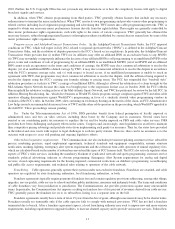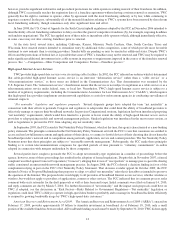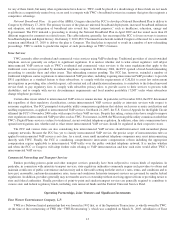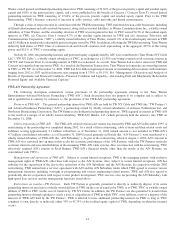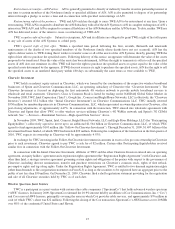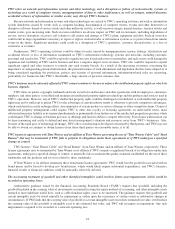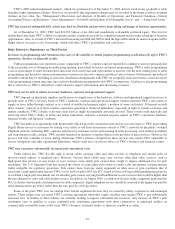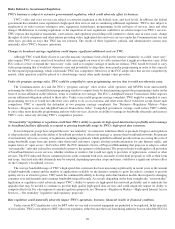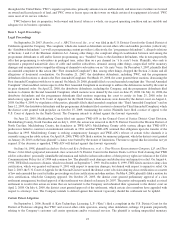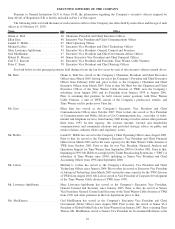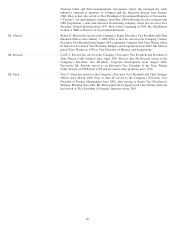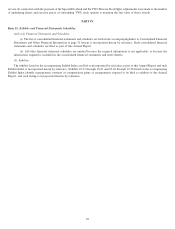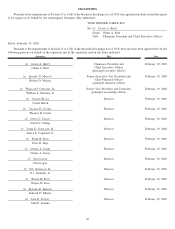Time Warner Cable 2009 Annual Report Download - page 33
Download and view the complete annual report
Please find page 33 of the 2009 Time Warner Cable annual report below. You can navigate through the pages in the report by either clicking on the pages listed below, or by using the keyword search tool below to find specific information within the annual report.permission to regulate rates or because the FCC has found that there is “effective competition.” Also, there is currently no rate regulation
for TWC’s other services, including high-speed data and voice services. It is possible, however, that the FCC or Congress will adopt more
extensive rate regulation for TWC’s video services or regulate other services, such as high-speed data and voice services, which could
impede TWC’s ability to raise rates, or require rate reductions, and therefore could cause TWC’s business, financial results or financial
condition to suffer.
TWC may have to pay fees in connection with its cable modem service.
Local franchising authorities generally require cable operators to pay a franchise fee of five percent of revenue, which cable
operators collect in turn from their subscribers. TWC has taken the position that under the Communications Act, local franchising
authorities are allowed to impose a franchise fee only on revenue from “cable services.” Following the FCC’s March 2002 determination
that cable modem service does not constitute a “cable service,” TWC and most other multiple system operators stopped collecting and
paying franchise fees on cable modem revenue.
The FCC has initiated a rulemaking proceeding to explore the consequences of its March 2002 order. If either the FCC or a court
were to determine that, despite the March 2002 order, TWC is required to pay franchise fees on cable modem revenue, TWC’s franchise
fee burden could increase going forward. TWC would be permitted to collect those increased fees from its subscribers, but doing so could
impair its competitive position as compared to high-speed data service providers who are not required to collect and pay franchise fees.
TWC could also become liable for franchise fees back to the time TWC stopped paying them. TWC may not be able to recover those fees
from subscribers. Most courts interpreting the rules, including several instances involving TWC, have determined that cable operators are
not required to pay these fees on cable modem service.
The IRS and state and local tax authorities may challenge the tax characterizations of the Adelphia Acquisition (as defined below),
the Redemptions (as defined below) and the Exchange (as defined below), or TWC’s related valuations, and any successful challenge
by the IRS or state or local tax authorities could materially adversely affect TWC’s tax profile, significantly increase TWC’s future
cash tax payments and significantly reduce TWC’s future earnings and cash flow.
The acquisition by TW NY Cable and Comcast of assets comprising in aggregate substantially all of the cable assets of Adelphia
Communications Corporation (the “Adelphia Acquisition”) was designed to be a fully taxable asset sale, the redemption by TWC of
Comcast’s interests in TWC (the “TWC Redemption”) was designed to qualify as a tax-free split-off under section 355 of the Internal
Revenue Code of 1986, as amended (the “Tax Code”), the redemption by TWE of Comcast’s interests in TWE (the “TWE Redemption”
and collectively with the TWC Redemption, the “Redemptions”) was designed as a redemption of Comcast’s partnership interest in
TWE, and the exchange between TW NY Cable and Comcast immediately after the Adelphia Acquisition (the “Exchange”) was
designed as an exchange of designated cable systems. There can be no assurance, however, that the Internal Revenue Service (the “IRS”)
or state or local tax authorities (collectively with the IRS, the “Tax Authorities”) will not challenge one or more of such characterizations
or TWC’s related valuations. Such a successful challenge by the Tax Authorities could materially adversely affect TWC’s tax profile
(including TWC’s ability to recognize the intended tax benefits from the Adelphia/Comcast Transactions), significantly increase TWC’s
future cash tax payments and significantly reduce TWC’s future earnings and cash flow. The tax consequences of the Adelphia
Acquisition, the Redemptions and the Exchange are complex and, in many cases, subject to significant uncertainties, including, but not
limited to, uncertainties regarding the application of federal, state and local income tax laws to various transactions and events
contemplated therein and regarding matters relating to valuation.
If the Separation Transactions, including the Distribution, do not qualify as tax-free, either as a result of actions taken or not taken by
TWC or as a result of the failure of certain representations by TWC to be true, TWC has agreed to indemnify Time Warner for its taxes
resulting from such disqualification, which would be significant. In addition, the restrictions imposed on TWC in connection with the
tax treatment of the Distribution could limit TWC’s ability to engage in certain corporate transactions.
As part of the Separation Transactions, Time Warner received a private letter ruling from the IRS and Time Warner and TWC
received opinions of tax counsel confirming that the Separation Transactions should generally qualify as tax-free to Time Warner and its
stockholders for U.S. federal income tax purposes. The ruling and opinions rely on certain facts, assumptions, representations, and
undertakings from Time Warner and TWC regarding the past and future conduct of the companies’ businesses and other matters. If any of
these facts, assumptions, representations or undertakings are incorrect or not otherwise satisfied, Time Warner and its stockholders may
not be able to rely on the ruling or the opinions and could be subject to significant tax liabilities. Notwithstanding the private letter ruling
and opinions, the IRS could determine on audit that the Separation Transactions should be treated as taxable transactions if it determines
that any of these facts, assumptions, representations or undertakings are not correct or have been violated, or for other reasons, including
as a result of significant changes in the stock ownership of Time Warner or TWC after the Distribution.
Under the tax sharing agreement among Time Warner and TWC, TWC generally would be required to indemnify Time Warner
against its taxes resulting from the failure of any of the Separation Transactions to qualify as tax-free as a result of (i) certain actions or
failures to act by TWC or (ii) the failure of certain representations made by TWC to be true. Due to the potential impact of significant
21


